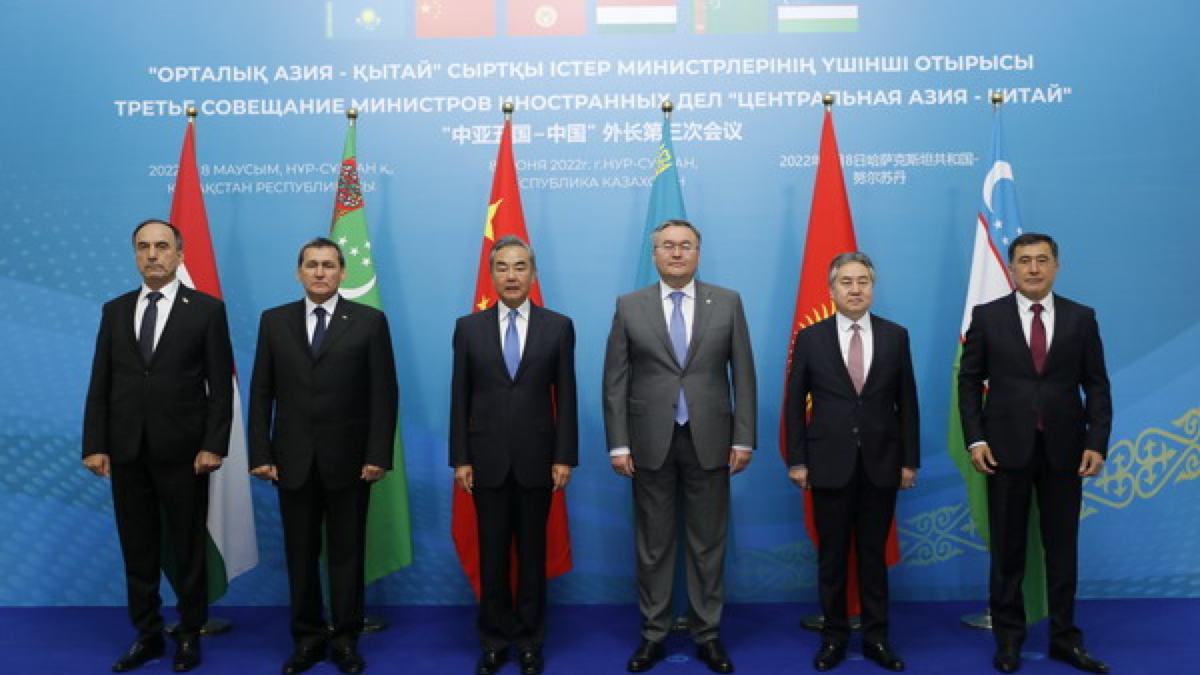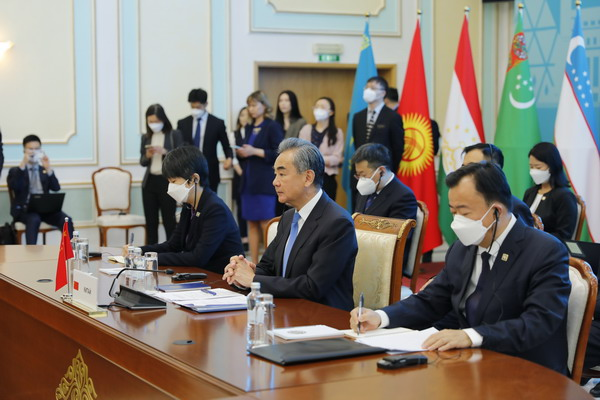
Chinese State Councilor and Foreign Minister Wang Yi attended the third "China+Central Asia" (C+C5) Foreign Ministers' Meeting which was chaired by Kazakh Deputy Prime Minister and Foreign Minister Mukhtar Tileuberdi and attended by Turkmen Deputy Prime Minister and Foreign Minister Rashid Meredov, Kyrgyz Foreign Minister Jeenbek Kulubaev, Tajik Minister of Transport Azim Ibrohim, and Uzbek Acting Foreign Minister Vladimir Norov, in Nur-Sultan, Kazakhstan, June 8, 2022. /China's Ministry of Foreign Affairs
Chinese State Councilor and Foreign Minister Wang Yi attended the third "China+Central Asia" (C+C5) Foreign Ministers' Meeting which was chaired by Kazakh Deputy Prime Minister and Foreign Minister Mukhtar Tileuberdi and attended by Turkmen Deputy Prime Minister and Foreign Minister Rashid Meredov, Kyrgyz Foreign Minister Jeenbek Kulubaev, Tajik Minister of Transport Azim Ibrohim, and Uzbek Acting Foreign Minister Vladimir Norov, in Nur-Sultan, Kazakhstan, June 8, 2022. /China's Ministry of Foreign Affairs
Editor's note: Hannan Hussain is a foreign affairs commentator and author. He is a Fulbright recipient at the University of Maryland and a former assistant researcher at the Islamabad Policy Research Institute. The article reflects the author's opinions and not necessarily the views of CGTN.
Chinese State Councilor and Foreign Minister Wang Yi paid an official visit to Kazakhstan and attended the third China + Central Asia (C+C5) foreign ministers' meeting. Countries converged on the need to safeguard regional peace and stability, deepen cooperation into a host of fields, and further advance the C+C5 cooperation mechanism to facilitate multi-stakeholder dialogue between all six partners.
Beijing's expectations for consolidating mutual political trust stood accommodated as nations vowed to back traditional and non-traditional security cooperation against the "three evil forces" – namely terrorism, extremism and separatism. This particular consensus matters as it is in line with a key element of President Xi Jinping's fivefold proposals for a closer China-Central Asia community. Earlier in the year, Xi referenced key regional developments in Central Asia as part of his appeal to nations to firmly oppose interference in internal affairs, and push back against any external forces aiming to disrupt peace in the neighborhood. Wednesday's consensus gives new strength to principles of mutual respect, good-neighborly friendship and solidarity that lie at the heart of China-Central Asia ties, ensuring one voice against pressing security challenges.
Deep concerns about crisis spillovers, particularly in the context of the Ukraine conflict, demand such assurances too. It is here that Wang's call for the five Central Asian states to stand firm, eliminate interference, and cooperate "in good faith" emerges consistent with the C+C5 consensus on international fairness and justice, as agreed during the second foreign ministers' meeting in Xi'an City, Shaanxi Province, last year.

Chinese State Councilor and Foreign Minister Wang Yi attends the third China + Central Asia (C+C5) foreign ministers' meeting in Nur-Sultan, Kazakhstan, June 8, 2022. /China's Ministry of Foreign Affairs
Chinese State Councilor and Foreign Minister Wang Yi attends the third China + Central Asia (C+C5) foreign ministers' meeting in Nur-Sultan, Kazakhstan, June 8, 2022. /China's Ministry of Foreign Affairs
On stepping up multilateral cooperation, it is a welcome sign for China and Central Asian powers to agree to diversify engagement in education, technology, arts, sports, tourism, poverty elimination and green development fields. Note how some of the mainstays of China-Central Asia cooperation over the years have included expanding energy cooperation and trade: stability there makes the case for expanding cooperation on other fronts. Bilateral trade itself remains on course for an increase to $70 billion by 2030. It is thus in the interests of China and its partners to inject momentum into diverse cooperation fields, and optimize future gains from their sub-national cooperation mechanism.
On core issues, Central Asian countries' continued support for the Global Security Initiative and the Global Development Initiative highlight a growing understanding to contribute constructively to international governance. For instance, advancing more deliverables under the Belt and Road Initiative was a key expectation from Beijing during the visit. The third China-Central Asia (C+C5) foreign ministers' meeting not only invites deliberation on local currency settlements and connectivity imperatives, but also recognizes the role of political parties localities and think tanks in evolving multi-stakeholder dialogue. That is a necessary recipe to release the full potential of cooperation between partners, as agreed.
Interestingly, in a separate exchange with Kazakh Deputy Prime Minister and Foreign Minister Mukhtar Tileuberdi, a four-point consensus underlined important lessons for fostering the "next golden three decades" of China-Kazakhstan ties. From synergizing development strategies, to upholding the "Shanghai Spirit" under the international justice banner, Beijing's support for Kazakhstan's increasingly constructive role in international and regional affairs stands illuminated. It also helps to recall how years of progress has positioned China as Kazakhstan's primary trade and investment partner, and the latter as a key player in Beijing's energy supplies. Taken together, a strong foundation for their permanent comprehensive strategic partnership makes stepped-up Belt and Road construction, anti-epidemic and trade cooperation worth watching in the years ahead.
Ultimately, Wang's visit to Kazakhstan opened up new avenues for strengthening political trust and future economic gains with Central Asia. Mutually agreed principles of engagement give common concerns one voice. Moreover, agreement on a mechanism of regular exchanges between heads of state enables countries to optimally leverage the strengths of the C+C5 platform.
(If you want to contribute and have specific expertise, please contact us at opinions@cgtn.com. Follow @thouse_opinions on Twitter to discover the latest commentaries in the CGTN Opinion Section.)

